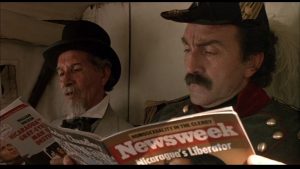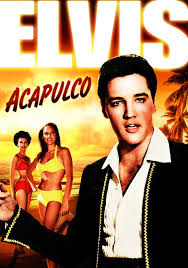John Parker August 7: Walker (1987)
I enjoyed the film tremendously for both its cinematographic and literary merit. I thought the acting was excellent, as were the music and décor. In fact, as I learned later, Alex Cox filmed this in Nicaragua and during a time of civil strife with Sandinistas battling Contras and Ronald Reagan pleading for America to help the “brave Freedom Fighters.” Yaz mentions that this is an American-help-goes-bad story and calls Walker a “cruel dictator” who believes that because of God’s design, “victory is with us.” My interest in the film, however, is really more for its literary reference, as I will try to convince later on. I may be going out on a limb here, but not too far I hope. I’d love to develop this into my final project for Jon.
I see this film as Joseph Conrad’s Heart of Darkness (1899). The helicopter that arrives with American soldiers emphasizes a connection to the film Apocalypse Now (1979). The modern magazines and cars that we see previously prepare us for this highly dramatic and over-the-top incursion near the end. In Heart of Darkness, Kurtz, an English ivory trader named Mr. Kurtz wreaks havoc with the local population in the jungles of British colonial Africa. Conrad’s denunciation of colonialism is replayed later when Marlon Brandon plays Colonel Kurtz in Francis Ford Coppola’s Apocalypse Now dealing with the Vietnam War. One of his most famous lines is “the horror, the horror,” right out of Conrad. Aex Cox’s William Walker is yet another mercenary with flexible ideals who Nayid says “takes power by force and changes the rules of engagement.” Walker and his men, in an attempt to create a “more civilized nation,” re-establish slavery and are overtly contempt of the local Indigenous population.
Conrad, through the narrator of Heart of Darkness, attacks colonialism and its supposed civilizing plan. He even equates civilized people with the savages, the city of London with the isolated wilds of Africa, the intentions of colonialism with the destruction of people native to the land. Mr. Kurtz says: “Exterminate all the brutes.” He leaves traces of desolation everywhere he has been and eventually becomes an embarrassing problem to the powers that be; they eventually abandon him and even want him dead. Crazy Walker, hungry for power, abuses the locals and is constantly reviewing his political and moral agendas. Like Fred Dobbs in Treasure of the Sierra Madre, he goes crazy in an exotic land that abounds with riches for his taking. He eventually loses everything. He is abandoned by the society he tried to establish and by those who initially sponsored his mission that became his quest for self-aggrandizement. Like “Wrath of God,” as Don Lope de Aguirre called himself, like Mr. Kurtz and later Colonel Kurtz, he cannot contain the havoc that he has caused.




